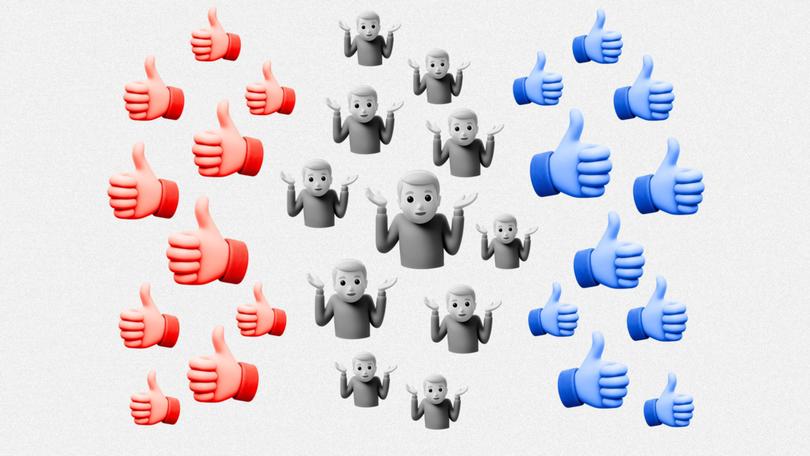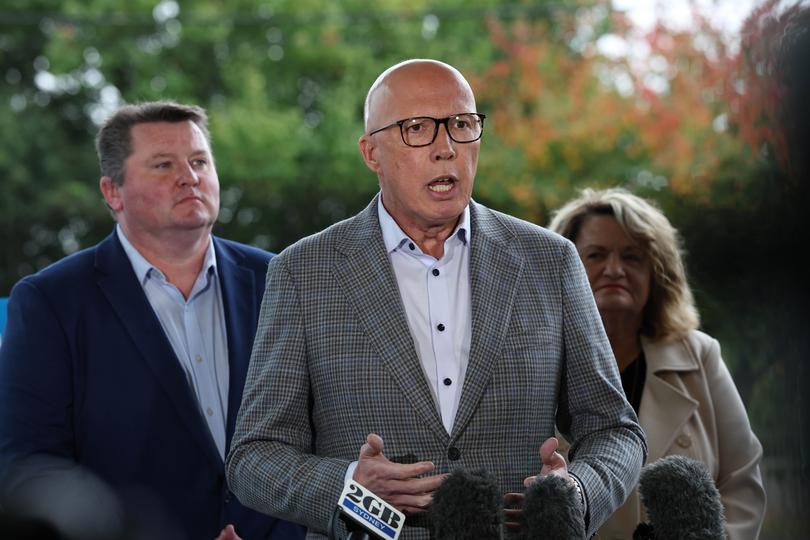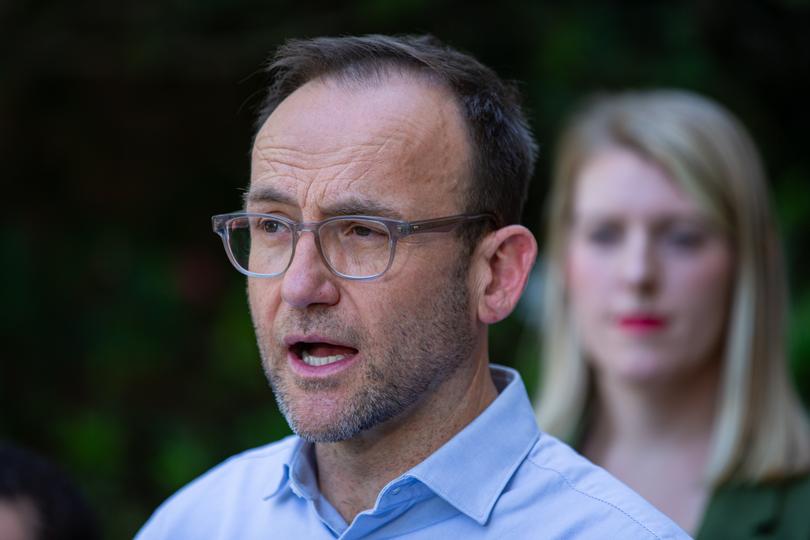Federal election 2025: Anthony Albanese and Peter Dutton blitz enemy territory in bid to snare swing voters
The latest Essential poll on April 29 revealed 30 per cent of voters think they know who they will cast their ballot for ‘but might change my mind’, with nine per cent still fully undecided.

Prime Minister Anthony Albanese and Opposition Leader Peter Dutton are blitzing enemy territory in the precious last days of the election campaign, but pollsters have warned their offensive could make little impact on huge swathes of wavering voters.
As Australia approaches election day, the latest Essential poll on April 29 revealed 30 per cent think they know who they will vote for “but might change my mind”, with nine per cent still fully undecided – injecting huge uncertainty into the final outcome.
Electoral analysts suggest it is unlikely at this stage that either Labor or the Coalition can lure significant numbers to their side as Australia follows the trend of other major democracies for voters to abandon major parties in droves.
Sign up to The Nightly's newsletters.
Get the first look at the digital newspaper, curated daily stories and breaking headlines delivered to your inbox.
By continuing you agree to our Terms and Privacy Policy.“It’s definitely a trend that’s entrenched around the world,” said Michele Levine, CEO of Research firm Roy Morgan, advising political parties to focus on truth, trust and transparency.
“We’ve been saying for a long time that about a third of the population are voting alternatively,” she said.
“Our view is that this election is being held in a miasma of distrust. People don’t believe either party.”
Roy Morgan’s latest data, released on Monday, showed Labor to have a slightly increased majority, on 53 per cent, ahead of the Coalition’s 47 per cent on a two-party preferred basis.
Primary support had changed little over week four of the campaign, with the Coalition on 34.5 per cent nosing ahead of Labor’s 34 per cent.
It also showed shifts in primary support for the minority parties, with the Greens dropping 1.5 per cent to 13 per cent, while support for One Nation rose 1.5 per cent to 7.5 per cent.
A further 11 per cent of voters were turning to other minor parties, including two per cent to the teal independents and 1.5 per cent to Clive Palmer’s ‘Trumpet of Patriots’.
The large number of undecided voters amplifies the impact of the preferential system but also makes the flow of preferences more volatile, particularly as One Nation rises as a serious voting bloc.
While Greens are expected to preference Labor and other conservative parties find their preferences heading to the Coalition, One Nation could feed back to Labor, said Ms Levine.
“They’re younger voters, and they’re not necessarily private enterprise. They’re just, again, the intelligentsia. So that’s why it makes it very difficult to see what’s going to happen,” she said.
Dr Jill Sheppard, from the ANU’s school of politics, said the primary vote was so dire that it would be difficult for either major party to claw back support.
“A real problem of the whole campaign is that they’re trying so hard to focus on these specific marginal seats. That means they haven’t been able to tell a really cohesive story,” she said.

The Liberals’ decision to eschew a distinct policy platform for piecemeal policies directed at important constituencies had underestimated just how soft the majority of voters were, she said.
The focus in the last stretch on national security, border control, tax cuts, economic security and culture wars felt like a “Hail Mary” in the context of a moderate campaign, she said.
Labor was “trying to emphasise confidence and calmness,” but the success of that strategy depended on whether they were trying to win back soft voters on the right or on the left.
“Both parties are trying to build together coalitions of voters that don’t make that much sense,” she said.
Dr Sheppard agreed that One Nation added to the poll’s unpredictability, with the risk for the Coalition that the advantage of preferencing could tip into vote creep that could eat into its seat tally.
The phenomena of one third of the electorate voting for non-major party candidates meant the outcome was “much trickier” to predict and left Labor and the Coalition “still in a two-party race.”
Both major parties have embraced this uncertainty to capture as many ballots as possible in the frantic dash to the finishing line.
Mr Dutton began the week with the intention to hit up to 28 key electorates, mainly held by Labor, in his quest to gain 21 seats to secure a majority.
After an address to the National Press Club on Wednesday, the Prime Minister will target key locations in six states over the closing days of the contest to reinforce his main messages, including Labor’s promise to boost Medicare.
He launched into the campaign’s final week with stops to four Liberal-held seats and a visit to the Brisbane electorate of Griffith, which the Greens’ Max Chandler-Mather snatched from Labor in 2022.
Speaking in Melbourne on Tuesday, Greens leader Adam Bandt, defended his colleague as having “done more than any member of parliament to put renters and first home buyers on the political agenda.”

The Greens have flagged a series of demands on Labor if they hold the balance of power in a hung parliament, including a ban on new coal or gas projects, the reform of negative gearing and an end to capital gains tax discounts on investment properties.
“More and more people are realising that we can’t keep voting for the same two parties and expecting a decent result,” said Mr Bandt.
The high number of floating voters also raises the prospect of more negotiating power for independents on the crossbench of the next parliament. Independents have also offered a range of views on why people are turning from the traditional parties.
“The major parties have done this to themselves - they put the interests of their own parties and their own careers before the interests of the Australian people,” said Tasmanian independent Senator Jacqui Lambie,
“They aren’t transparent and the only time they work together is to protect their own power,” she said.
Independent MP Kate Chaney, who is contesting the WA seat of Curtin, where she was first elected in 2022, said local people were “fed up with politics that only looks as far ahead as the next election” and “real leadership” not “short-term sugar hits.”
Voters said they wanted MPs “with the courage to tackle the big, long-term challenges we face, from housing to climate to economic management,” she added.
“There’s a real sense in Curtin that the major parties are stuck in the past. People are tired of the status quo and they want something better.”

